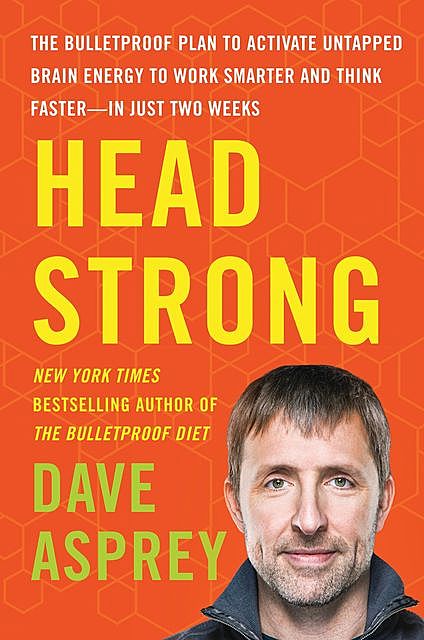Head Strong
- About
- Impressions2
- Readers14
- Related books
- 洪一萍has quoted5 years agoFasting improves myelination and myelin regeneration in the brain and helps reduce inflammation throughout the body. Fasting also switches on your cellular detox system, autophagy. When this happens, you eliminate cellular waste. It is the equivalent of a deep cleaning for your brain, and it feels amazing.
- 洪一萍has quoted5 years agoRECOMMENDED DOSE: Here’s how to get at least 1 gram, preferably 2 grams, of polyphenols per day:
• Drink 2 to 5 cups of coffee (mold-free to avoid inhibiting mitochondria) and/or 2 to 6 cups of green tea
• Eat 1 to 2 servings of dark chocolate
• Consider 100–300 mg green tea extract and 100 mg resveratrol supplements or the broader- spectrum mixed polyphenol supplements mentioned above. There is also a Head Strong formula available that combines the above types of polyphenols.
TIME OF DAY: Anytime - 洪一萍has quoted4 years agoThere are two things you can do to limit the damaging effects of junk light, and we’ll explore each in greater detail in the following two sections. The first is to cut down on your exposure to blue light. The second is to increase your exposure to high-quality light sources to balance out the excess blue you get. Sunshine is best, but you probably aren’t going to spend hours outside if you have an office job or live in a Pacific Northwest rain forest like I do. Don’t worry—you can have a life and feel great even if the sun isn’t available as often as you need it. The Head Strong program will show you how.
- 洪一萍has quoted4 years agoYour mitochondria are meant to experience red light all day, with less blue at the start and end of the day. When we spend time outside, as nature designed humans to do, our eyes (and the mitochondria they contain) are constantly exposed to full-spectrum light. Unfortunately, these days we spend relatively little time outdoors soaking up the sunshine—and our mitochondria are paying the price. When we’re indoors we get tons of blue light, but no red, no infrared, and no UV. It’s no wonder the mitochondria get confused and don’t perform as well as they should.
- 洪一萍has quoted4 years agothings I learned along the way were nothing short of life changing. After a lot of experimenting, I discovered that relatively easy lifestyle changes could lead to much higher brain energy. This gave me the power to focus even in the most distracting environments, to remember more, and to think more creatively.
- 洪一萍has quoted4 years agoblue light “can cause cell dysfunction through the action of reactive oxygen species on DNA and that this may
contribute to cellular aging, age-related pathologies, and tumorigenesis [the creation of tumors].”3 Another study found that blue light changes mitochondrial shape and creates stress proteins in your eyes that are likely connected to macular degeneration (the deterioration of the central area of the retina, often resulting in vision loss). 4
Macular degeneration is the leading cause of blindness in developed countries. More than a third of the population over age seventy-five has it—including my father—so I find this side effect of junk light particularly troubling. I believe that the massive and unprecedented changes to our indoor lighting and mobile phone screens will cause a huge wave of macular degeneration at younger ages than ever before. Already, several studies correlate long-term history of exposure to junk light with macular degeneration. - 洪一萍has quoted4 years agoBlue light, however, causes an increase in free radical production but doesn’t trigger the cleanup signal to increase antioxidant production. Instead of traveling to the cell nucleus, the excess free radicals stay under the cell membrane, resulting in macular degeneration and decreased energy production, and outside the eyes it can even cause premature skin aging.
- 洪一萍has quoted4 years agoSo where are these damaging blue lights lurking? The main sources are the technological devices we spend our days staring into. The junk light from our smartphones, tablets, laptops, and e-readers (and from the LED bulbs in our surrounding environment) goes straight into our eyes and then into our brain, where it damages cells and lowers our performance.
- 洪一萍has quoted4 years agoYour eyes contain special light sensors that control your sleep timing. These sensors become activated at the frequency of 480 nanometers, which is in the blue spectrum. Your phone, TV, laptop, and every LED in your home all emit this light frequency. When it hits your eyes, each of the ten thousand mitochondria in your cells pays the price. Their energy production slows, they produce more free radicals, and the structure of the water they contain is altered. This causes inflammation and negatively impacts your sleep, preventing you from falling asleep easily and sleeping deeply. This stresses every system in your body and results in even more inflammation. It’s a slippery, sleepy, and poorly lit slope.
- 洪一萍has quoted4 years agoGABAto stay calm
and focused during his high-stakes business transactions. He felt so good that he was concerned about addiction. (Fortunately, not an issue!)
fb2epub
Drag & drop your files
(not more than 5 at once)


